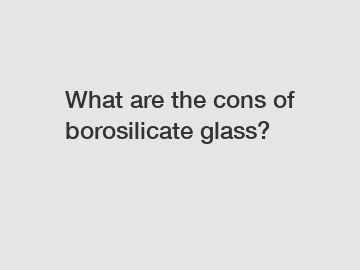Dec. 29, 2023
Packaging & Printing
What are the cons of borosilicate glass?
Borosilicate glass is a type of glass that is known for its durability and resistance to thermal shock. It is commonly used in laboratory glassware and kitchenware such as baking dishes and measuring cups. However, like any material, borosilicate glass also has its drawbacks. In this article, we will explore the cons of borosilicate glass to help you make an informed decision about its usage.
1. Higher cost compared to other glass types.

One of the major drawbacks of borosilicate glass is its higher cost compared to other types of glass. The production process of borosilicate glass involves the addition of boron oxide which results in a higher manufacturing cost. This increased cost is then passed on to the consumer, making borosilicate glassware more expensive compared to alternatives such as soda-lime glass. The higher cost can be a deterrent for some individuals or businesses, especially when considering large-scale purchases.
2. Limited availability and variety.
While borosilicate glassware is commonly used in laboratories and certain kitchen applications, its availability and variety can be limited. Compared to other types of glass, borosilicate glass products may have a narrower range of options in terms of size, shape, and design. This can be a constraint for individuals or businesses that require specific customization or have unique preferences for their glassware. In such cases, alternative glass types might be more suitable.
3. Brittle nature.
Despite being known for its durability, borosilicate glass is still relatively brittle compared to other materials. While it can withstand rapid temperature changes, it is more prone to cracking or breaking if dropped or mishandled. This fragility can be a concern in certain environments, especially where accidental impact or rough handling is more likely to occur. It is important to handle borosilicate glassware with care to avoid breakages and potential injuries.
4. Limited heat resistance.
While borosilicate glass is resistant to thermal shock, it does have its limits in terms of heat resistance. It can withstand high temperatures up to a certain point, beyond which the glass may start to deform or even melt. This limitation restricts its use in applications that require exposure to extremely high temperatures, such as in industrial processes or specialized scientific experiments. For such applications, alternative materials with higher heat resistance may be more appropriate.
In conclusion, borosilicate glass has its share of disadvantages that need to be taken into consideration. These include its higher cost, limited availability and variety, brittleness, and limited heat resistance. Despite these cons, borosilicate glass remains a popular choice for many applications due to its numerous advantages, such as durability and resistance to thermal shock. The decision to use borosilicate glass or opt for an alternative material ultimately depends on the specific requirements and preferences of the user.
If you have any further questions or would like to know more about borosilicate glass, please do not hesitate to contact us. We are here to assist and provide you with the information you need to make the right choice for your glassware needs.
If you are looking for more details, kindly visit neutral borosilicate glass vials, neutral glass tube, glass ampoules for sale.
Previous: Which Under-the-Radar Spirits Shine in 750ml Clear Liquor Bottles?
Next: What are the advantages of reusing empty butter tubs for purchases?
If you are interested in sending in a Guest Blogger Submission,welcome to write for us!
All Comments ( 0 )